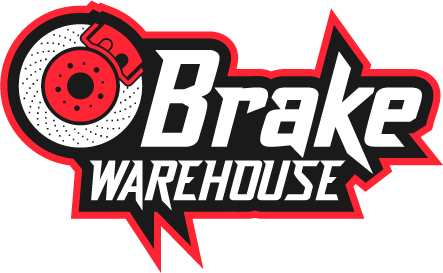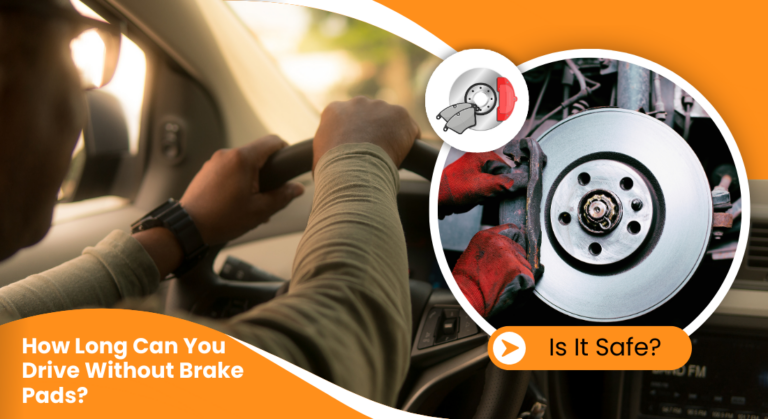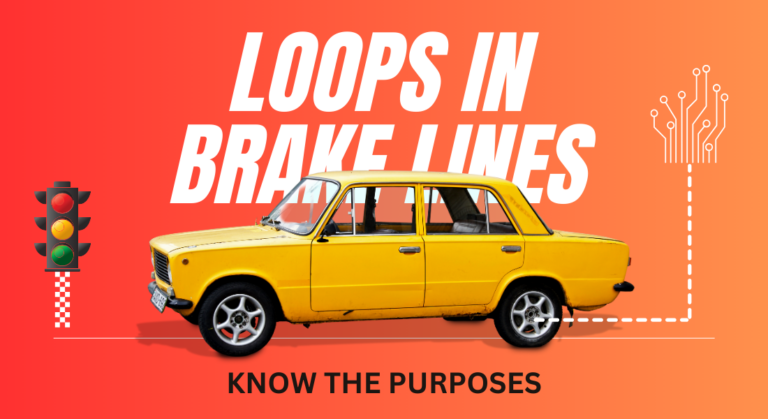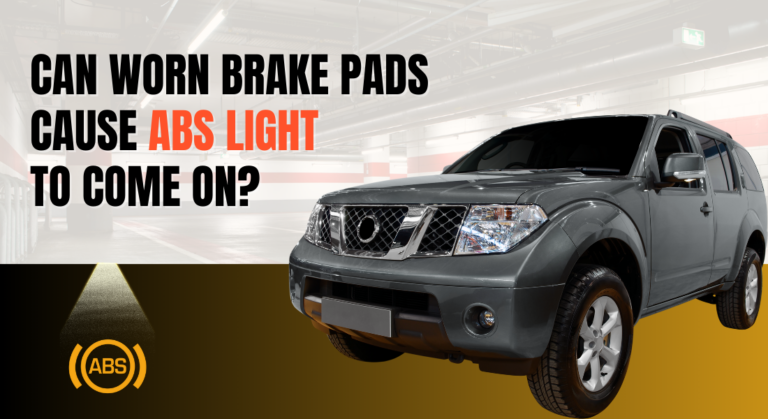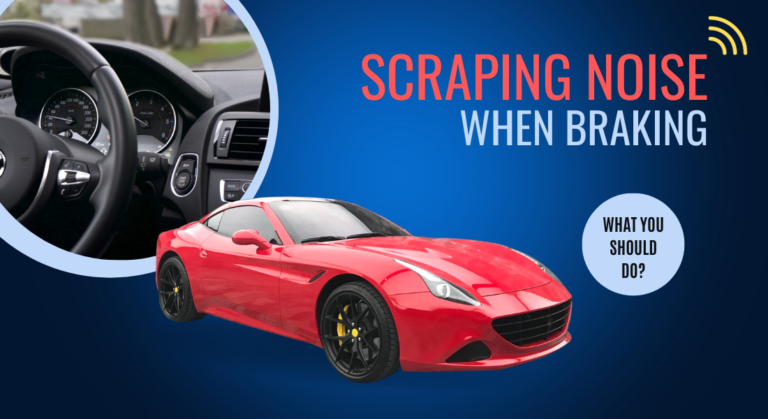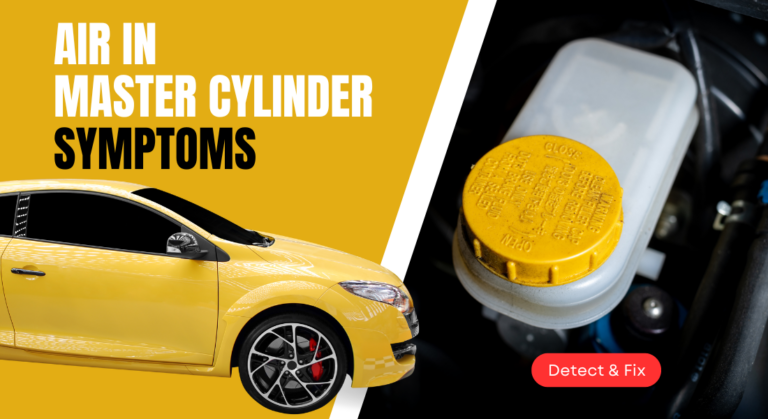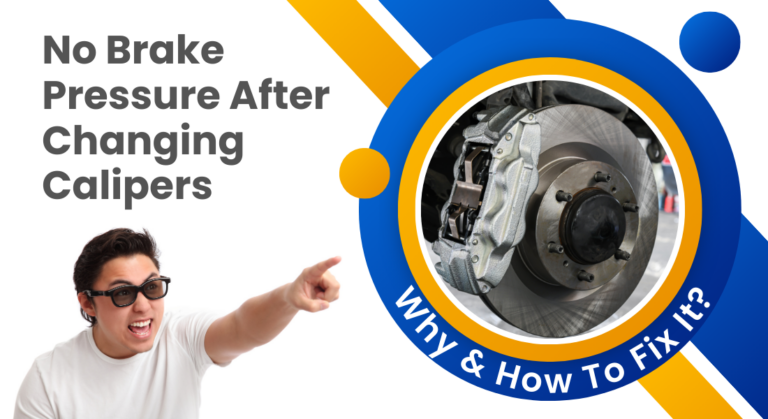Car Jerks When Braking And Accelerating – Why & How To Fix?
If your vehicle suddenly lurches forward or backward when braking or accelerating, it clearly indicates something is amiss under the hood. These jerks, lunges, and shuddering motions indicate potential problems. It could be an issue that can negatively impact performance and potentially create unsafe driving conditions.
Understanding the root cause should be your first step to determine the appropriate fix. You need to isolate the culprit component and diagnose the issue for repair or replacement as soon as possible.
This will help prevent further damage and make your acceleration and braking smooth and responsive again. Go over the many possible causes.
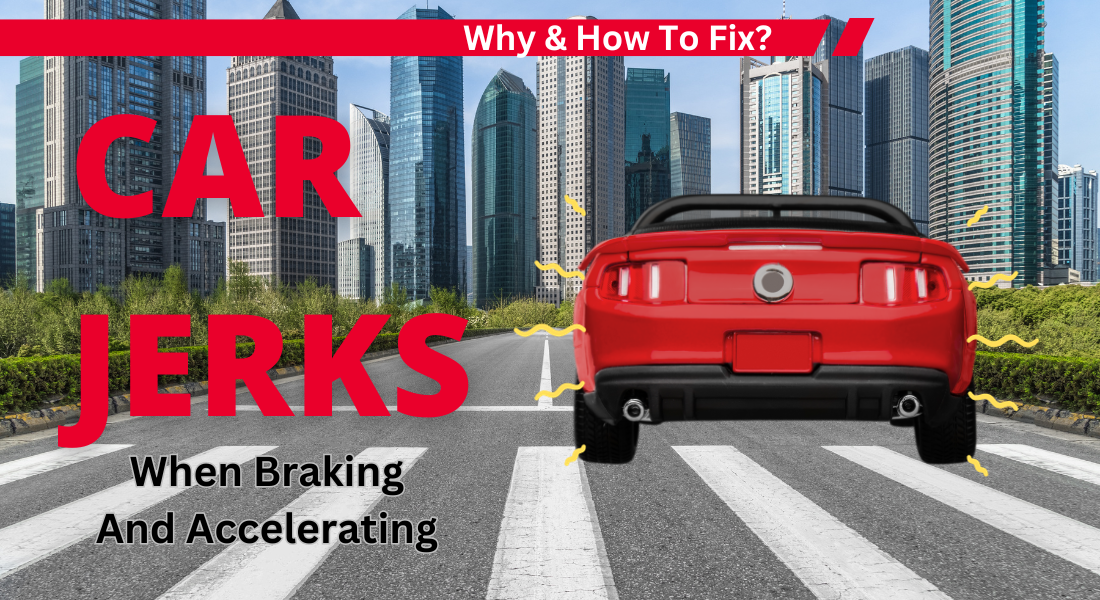
What Causes Car Jerk When Braking And Accelerating?
The Common causes of the car jerking when braking or accelerating include issues with the braking or acceleration systems. The reasons also lie under suspension or drivetrain components.
Possible causes of jerking include as follows.
- Worn-out brake pads
- Warped brake rotors
- Worn out suspension
- Damaged accelerator cable
- Dirty or faulty fuel injectors
- Dirty air filter
- Dirty or damaged mass air flow sensor
- Blocked or clogged catalytic converter
- Faulty transmission control module
- Defective carburetor
- Loose wheel bearings
- Blocked or damaged gas lines
- Bad spark plugs
- Faulty fuel pump
Let’s break down the reasons and learn the details of them.
Why Car Jerking When Braking
The following are the main reasons that jerk the car while braking.
Worn Out Brake Pads

When your brake pads wear down over time, they lose grip and enough friction to stop the car smoothly.
The thinner brake pads make partial contact with the rotors, causing an uneven braking force causing the jerk.
Read Also: How Long Will 3mm Brake Pads Last? (The Ideal Thickness)
Warped Brake Rotors

Your brake rotors can become warped or distorted over time due to overheating, excessive wear, or uneven cooling. When your rotors are warped, the surface has high and low spots.
When you apply the brakes, the pads hit the high and low spots first, causing your vehicle to shake or pulse and the steering wheel to shake.
Read Also: Brake Pad Rubbing On Rotor While Driving – How To Fix?
Worn-Out Suspension

Your vehicle’s suspension absorbs shock from the road. When suspension components like shocks, struts, and bushings wear out, they cannot absorb braking impacts as effectively.
When you apply the brakes, the car bounces and jerks because the worn suspension cannot dampen the braking forces. Some signs your suspension is worn out include:
- Your ride has been uncomfortable recently.
- You’re hearing knocking, rattling, or squeaking noises.
- Your vehicle bounces or seems to dive as you go over bumps.
- You have loose handling or play in the steering wheel.
Malfunctioning ABS System

Your ABS (anti-lock braking system) is designed to prevent your wheels from locking up when you apply the brakes. However, if your ABS malfunctions, it cannot regulate brake pressure properly.
That means that when you apply the brakes, your wheels may lock up intermittently. This will cause the engaging and disengaging of the ABS and cause your vehicle to jerk or shudder.
Vacuum Leak
Your brake booster uses a vacuum created by the engine to make breaking easy and smooth. If there is a small leak, the brake booster can operate intermittently, causing your brakes to feel jerky when applied. If this is the cause, you may feel the braking getting harder to press.
Worn Out Brake Drums

If your vehicle has rear drum brakes and the drums are badly worn, this can also cause the vehicle to jerk when you apply the brakes. As the drum wears, the internal diameter increases. This means there is a larger gap between the drum and brake shoes.
When you press the brake pedal, the brake shoes must travel further to contact the drum. This can create a lag in braking and cause sudden braking action once contact is made, resulting in jerks and pulsations.
Read Also: Brakes Feel Like They Are Skipping – What Are The Causes?
Loose Wheel Bearings
Wheel bearings can also cause jerking. How? These bearings allow your wheels to rotate smoothly and without much resistance. Over time, they can lose their alignment, become loose, or break due to normal wear and tear.
When this happens, the wheels can move more freely within the bearings, causing resistance and friction when they rotate. This extra resistance and friction are felt as jerking or pulsating sensations when you apply your brakes.
Here is a video detailing how to change the wheel bearing:
Why Car Jerking When Accelerating?
Here are the reasons that jerk the car while accelerating.
Damaged Accelerator Cable

When the accelerator cable connecting the gas pedal to the throttle is damaged, it can cause it to open inconsistently. This means the throttle does not open smoothly or promptly when pressuring the gas pedal.
As a result, the engine does not receive enough gas, causing the car to jerk as you accelerate.
Dirty or Faulty Fuel Injectors

Fuel injectors spray fuel into the engine cylinders. However, they do not spray fuel evenly or consistently when they become dirty or faulty.
Consequently, when you accelerate, the engine does not receive the proper amount of fuel, causing it to misfire and the car to jerk.
Dirty Air Filter
A clogged air filter hinders the airflow into the engine. That causes the engine to receive insufficient air. It might not be completely clogged, allowing enough air to run the engine at low RPM.
But when you accelerate, you increase the demand for air, causing the jittering.
Dirty or Damaged Mass Air Flow Sensor

The mass air flow sensor determines how much air enters the engine. Sometimes, it gets contaminated with air, dirt, and other debris.
That causes it to provide incorrect information to the engine computer, causing the computer to adjust the air-fuel ratio incorrectly as you accelerate. As a result, the car jerks or hesitates as you press the gas pedal.
Faulty Transmission Control Module
The transmission control module regulates how the transmission shifts gears. When this module fails, it can cause issues with gear shifts.
You will notice the car may jerk as it tries to shift into the next gear. This can be caused by a faulty sensor input, wiring issue, or actual internal failure of the module.
Defective Carburetor
The carburetor controls the air-fuel mixture reaching the engine cylinders. If the carburetor gets clogged or becomes defective, it may provide an improper mixture of fuel and air.
As a result, when you press on the accelerator, the engine may not receive the right amount of fuel it needs to operate optimally. That will cause the car to jerk, surge, or misfire.
It could be clogged by debris or grime. You will want to remove it from the car and inspect it.
Read Also: Brakes Feel Like They Are Skipping – What Are The Causes?
Blocked or Damaged Gas Lines
This is another fuel-related problem that can cause your car to jerk. The fuel line can get clogged and restrict the fuel flow to the engine. The same would happen if there were a leak.
So, when you press the accelerator, the engine tries to up the rpm, but it’s running lean. That will lead to your car jerking.
Bad Spark Plugs

Faulty spark plugs are another common reason your car jerks when accelerating. Spark plugs are responsible for igniting the fuel-air mixture in the engine cylinders.
When spark plugs begin to fail, they cannot reliably produce the spark needed to ignite the fuel. As a result, you may experience engine misfiring and jerking, especially at high RPMs.
Faulty Fuel Pump
A failing fuel pump can also be the culprit behind a jerky acceleration. The fuel pump’s role is to deliver fuel under pressure to the fuel injectors and carburetor.
Unfortunately, as fuel pumps age, their efficiency decreases, and they may need help to provide adequate fuel flow for smooth acceleration.
Typically, the pump is about to max out its lifespan or has a wiring issue.
Read Also: Scraping Noise When Braking – Why & What You Should Do?
Frequently Asked Questions (FAQs)
Below are some frequently asked questions closely related to the topic that might interest you.
Is It Safe To Continue Driving My Car If It Jerks When Braking Or Accelerating?
It is not safe to continue driving your car if it jerks when braking or accelerating. The issue indicates a problem that could worsen and compromise your ability to control the vehicle. You should have the vehicle inspected by a mechanic as soon as possible.
How Much Does It Typically Cost To Fix A Car That Jerks When Braking?
The cost to fix a car that jerks when braking depends on the specific underlying issue. But it commonly ranges from a few hundred dollars up to $1,000 or more.
Common solutions involve replacing brake pads, which may cost $100-$200 per axle, or brake rotors, typically $150-$400 per axle. More complex issues like faulty calipers or other brake components can drive the repair cost significantly higher.
Conclusion
If your car jerks when braking and accelerating, it could be any of the discussed problems. You need to do an elimination method starting with the simplest. That way, you might solve the problem before getting to the last possible culprit.
Remember, most of these causes are preventable with proper car maintenance. So, if it has been a long since you serviced your vehicle, doing so might fix the jerking problem. Of course, if all these feel overwhelming, you can take your vehicle to a technician for troubleshooting and fixing.

Meet Zayan, the mechanical genius behind the highly acclaimed brakes problems and solutions website. With over a decade of hands-on experience in the automotive industry, Zayan has become a trusted authority in the realm of brake systems.
His passion for cars, coupled with his expertise in solving complex brake-related issues, has earned him a devoted following of car enthusiasts, mechanics, and everyday drivers seeking reliable guidance.
